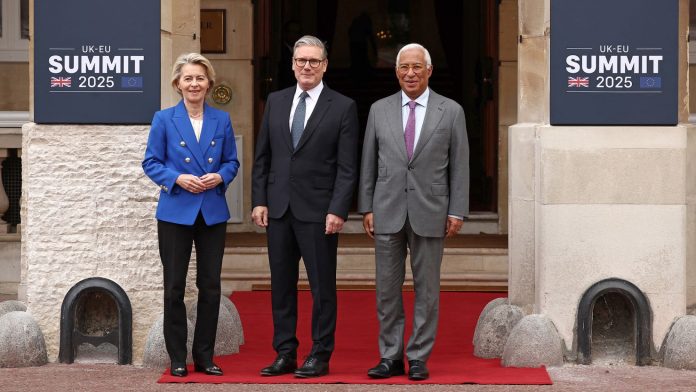After years of political tension caused by Brexit, the UK and the European Union have agreed on Monday on a major reset of their relationship — the most significant one since the UK left the bloc in 2020.
Key points of UK-EU post-Brexit reset
The new agreement, signed by British Prime Minister Keir Starmer and the heads of the European Commission and the European Council, aims to ease trade relations, strengthen defence co-operation and simplify the movement of citizens.
This rapprochement, however, is not only a diplomatic victory but also a potential political minefield for Starmer’s government. The deal touches on sensitive issues such as fishing and freedom of movement and could provoke a storm of criticism from Eurosceptics, particularly Reform UK leader Nigel Farage.
A central part of the agreement is a framework deal on defence and security, which opens up opportunities for British companies such as BAE Systems and Rolls Royce to participate in a large-scale European rearmament programme worth €150 billion. However, full access will require additional agreement at the EU industrial policy level.
Fisheries
An important compromise was also reached on fishing: EU and UK vessels will retain mutual access to each other’s waters until 2038. In return, London has secured a reduction in red tape and easier border procedures, which should help small food producers regain access to EU markets.
UK citizens will also be able to pass through passport control at EU airports more quickly thanks to the use of electronic gates. This will be a welcome relief for millions of travellers who have faced long queues since Brexit.
Youth exchanges and Erasmus to return for British students
The parties are also discussing the possibility of the UK participating in the Erasmus+ programme, which it opted out of when it left the EU. In addition, “youth mobility” remains on the agenda, with the idea that citizens aged 18 to 30 will be able to live, study and work temporarily on both sides of the Channel.
Although the details of this scheme have not yet been agreed, the parties have confirmed their general intention to deepen “people-to-people links, especially among young people.”
Despite the pragmatic tone of the agreement, controversy over its implications continues in the UK. Nigel Farage has already called the 12-year fishing agreement “a death sentence for the industry.” Conservatives have also condemned the deal, calling it a “surrender summit.”
Keir Starmer finds himself in a difficult position. On the one hand, he wants to improve relations with the EU and remove trade barriers that are holding back the economy. On the other hand, he cannot allow himself to be accused of trying to bring the country back into the EU fold. He has consistently stated that there will be no return to free movement, a customs union or a single market.
Britain back on the world stage
However, it is precisely the UK’s willingness to accept some European standards in exchange for lower trade costs that could cause tension within the country. Brexit supporters see this as a gradual departure from the stated goals of leaving the EU.
International instability linked to the actions of US President Donald Trump’s administration, the Russian-Ukrainian conflict and shifts in global trade have accelerated the need for a strategic review of relations.
The rapprochement between Starmer and French President Emmanuel Macron, particularly on the issue of support for Ukraine, has laid the foundation for a restart of dialogue. The parties recognise that the geopolitical threat requires unity, primarily in the areas of defence and energy security.
Britain has also concluded a trade deal with India and secured tariff concessions from the US. But economists believe that it is the restart of relations with the EU, its largest trading partner, that could have the greatest impact on the country’s stagnating economy.
Despite the solemn rhetoric and joint press conference in London, many aspects of the agreement require further negotiation. In particular, details on youth mobility, participation in Erasmus+, rules for access to defence tenders and formats for co-operation on migration remain unresolved.
The risk of Farage’s party gaining ground is also putting pressure on the government. His approval rating is rising, while Starmer’s popularity has fallen to a record low of 23%, according to YouGov. This means that any sign of excessive “Europeanisation” of policy could trigger a political backlash.
Nevertheless, Finance Minister Rachel Reeves called the day the agreement was signed “a very important moment,” noting that “for too long, it has been too difficult to trade and move between the UK and its closest neighbours.”
The deal between the UK and the EU is an attempt to overcome past differences and build a pragmatic model of co-operation amid global uncertainty. It does not reverse Brexit, but it does adjust its consequences.
